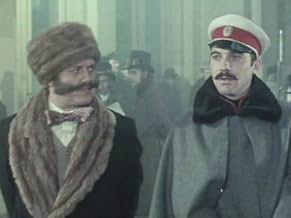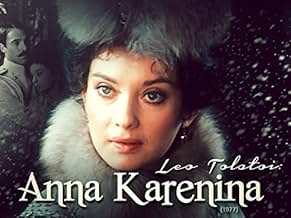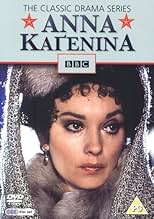Aggiungi una trama nella tua linguaAnna Karenina is the young wife of an older husband. She has an affair with the handsome Count Vronsky. By following her desires, Anna complicates her life.Anna Karenina is the young wife of an older husband. She has an affair with the handsome Count Vronsky. By following her desires, Anna complicates her life.Anna Karenina is the young wife of an older husband. She has an affair with the handsome Count Vronsky. By following her desires, Anna complicates her life.
- Candidato a 2 Primetime Emmy
- 5 candidature totali
Sfoglia gli episodi
Recensioni in evidenza
Whether this is better than other dramatizations of the book is irrelevant. If it's bad, it's bad--and this is bad. The fact that this version covers far more of the book--including Kostya Levin's story, which I think is more interesting than Anna's--just makes its atrocities even more unbearable.
What bothered me much more than its distortions of the book's characters and deviations from its plot is its dragging THE WHOLE BOOK down to the level of a soap opera. From the very first scene with Countess Vronskaya and Anna on the train, and in every single following scene, all the way through to the end, I felt like I was watching As The Word Turns--all 13,858 episodes. It made me sick.
To me, one of Tolstoy's most astonishing achievements in this book is that it NEVER--not for one scene or one paragraph or one word--falls into melodrama. Every character is alive and real, everything they do is believable and organic. Nothing is overblown or contrived.
This production is the exact opposite. EVERYTHING is overblown, EVERYTHING feels contrived and phony and stupid. It takes a very great book and turns it into cheap melodrama. What a disgrace.
What bothered me much more than its distortions of the book's characters and deviations from its plot is its dragging THE WHOLE BOOK down to the level of a soap opera. From the very first scene with Countess Vronskaya and Anna on the train, and in every single following scene, all the way through to the end, I felt like I was watching As The Word Turns--all 13,858 episodes. It made me sick.
To me, one of Tolstoy's most astonishing achievements in this book is that it NEVER--not for one scene or one paragraph or one word--falls into melodrama. Every character is alive and real, everything they do is believable and organic. Nothing is overblown or contrived.
This production is the exact opposite. EVERYTHING is overblown, EVERYTHING feels contrived and phony and stupid. It takes a very great book and turns it into cheap melodrama. What a disgrace.
10MVKSF
I have a poor VHS copy of the series from when it was shown on PBS in 1984. I have searched for years to locate a clean copy. It is worth viewing over and over again--the acting is tremendous.
The costuming and sets are great, and the series is true to the text and atmosphere of the original novel.
I recommend it to anyone, but for some reason it has not been issued or reissued in the market. BBC has reissued most of its major series in VHS or DVD. I hope that this will be the case for this great series.
This is a timeless story that is absolutely fundamental to an understanding or consideration of what it is like to live our lives out even with all the pitfalls and joys.
The costuming and sets are great, and the series is true to the text and atmosphere of the original novel.
I recommend it to anyone, but for some reason it has not been issued or reissued in the market. BBC has reissued most of its major series in VHS or DVD. I hope that this will be the case for this great series.
This is a timeless story that is absolutely fundamental to an understanding or consideration of what it is like to live our lives out even with all the pitfalls and joys.
Both of the leads, Nicola Paget and Stuart
Wilson, are nearly perfect in their roles. Wilson especially is a fully developed character and one a woman might fling away her life for. Nicola Paget is beautiful, high strung, and portrays Anna as a woman on the edge...more or less forced into an early marriage with a stuffy, pompous and very dull statesman. Only the love for her young son prevents her from divorcing at any cost. Meanwhile the love of her life Vronsky suffers for her as she drives herself to distraction. Wilson is really excellent as Vronsky and I also loved him as Fernando Lopez in The Pallisers. He is an underrated dramatic actor. The supporting characters are mostly well-cast and well-acted. I have watched many versions of this story and this version ranks at the top for me.
While the best film versions are the 1967 Russian and 1935 Greta Garbo films, the best overall adaptation seen so far of Tolstoy's masterpiece Anna Karenina goes to this mini-series, the only adaptation personally seen so far that doesn't have any major debits.
Visually, it is a real beauty, with some breath taking scenery and sets, opulent costume design and elegant photography with lots of handsome colour. The period detail is not quite as evocative as it is in the 1967 and 1997 (with Sophie Marceau) films, but it is still remarkably authentic for a 70s made-for-TV mini-series. The music is appropriate and hauntingly beautiful, wisely keeping itself to the background in crucial scenes to let the dialogue really register, including a rare chance of hearing glimpses of Tchaikovsky's Manfred Symphony used for a mini-series. The mini-series also has a very thought-provoking, beautifully structured and literate script, that feels and sounds like Tolstoy's writing coming to life from the pages of the novel, covering all the major events and more and with the full emotional impact and more.
The story of Anna Karenina is very faithfully adapted here, one of the most faithful treatments of any adaptation of the novel in fact. In terms of detail, the major events, the subplots, the themes and the characters are all here, and not in Cliff Notes form, this is the real deal. The long length, with the 9 hour plus duration and 10 episodes, was more than appropriate and allowed richer characterisation, more of the story (this adaptation has the most well developed Levin by far for example) and all the material to be fully expanded upon (things that a 2-4 hour film couldn't do as effectively), as was the steady and very measured pacing to allow one to get fully immersed in the atmosphere and let the many nuances of the story and text come through. Anna Karenina (1977) is beautifully directed throughout, and the characters and their situations are always interesting.
Nicola Pagett is outstanding as a particularly passionately vulnerable Anna, which is played with pitch-perfect heartfelt pathos, and Stuart Wilson blows all the Vronskys in the film adaptations out of the water in a portrayal that is much more complex than any of the portrayals in any of the film versions, where half of the cinematic Vronskys make for problematic casting. The chemistry between the two of them is very believable with no sudden transitions and it doesn't feel rushed. Eric Porter's Karenin, a role played to a consistently high level in all the adaptations even in the weaker ones, is more conflicted than most, rather than being too sympathetic or too much of a reptile, more of a man caught in situations that more expose his weaknesses than his strengths, and he plays it magnificently. Robert Swann stands out in support as an ambivalent and multi-layered Levin, in a cast where everybody comes off strongly with few if any weak links.
All in all, a superb adaptation, adapted Tolstoy rarely gets much better than this. 10/10 Bethany Cox
Visually, it is a real beauty, with some breath taking scenery and sets, opulent costume design and elegant photography with lots of handsome colour. The period detail is not quite as evocative as it is in the 1967 and 1997 (with Sophie Marceau) films, but it is still remarkably authentic for a 70s made-for-TV mini-series. The music is appropriate and hauntingly beautiful, wisely keeping itself to the background in crucial scenes to let the dialogue really register, including a rare chance of hearing glimpses of Tchaikovsky's Manfred Symphony used for a mini-series. The mini-series also has a very thought-provoking, beautifully structured and literate script, that feels and sounds like Tolstoy's writing coming to life from the pages of the novel, covering all the major events and more and with the full emotional impact and more.
The story of Anna Karenina is very faithfully adapted here, one of the most faithful treatments of any adaptation of the novel in fact. In terms of detail, the major events, the subplots, the themes and the characters are all here, and not in Cliff Notes form, this is the real deal. The long length, with the 9 hour plus duration and 10 episodes, was more than appropriate and allowed richer characterisation, more of the story (this adaptation has the most well developed Levin by far for example) and all the material to be fully expanded upon (things that a 2-4 hour film couldn't do as effectively), as was the steady and very measured pacing to allow one to get fully immersed in the atmosphere and let the many nuances of the story and text come through. Anna Karenina (1977) is beautifully directed throughout, and the characters and their situations are always interesting.
Nicola Pagett is outstanding as a particularly passionately vulnerable Anna, which is played with pitch-perfect heartfelt pathos, and Stuart Wilson blows all the Vronskys in the film adaptations out of the water in a portrayal that is much more complex than any of the portrayals in any of the film versions, where half of the cinematic Vronskys make for problematic casting. The chemistry between the two of them is very believable with no sudden transitions and it doesn't feel rushed. Eric Porter's Karenin, a role played to a consistently high level in all the adaptations even in the weaker ones, is more conflicted than most, rather than being too sympathetic or too much of a reptile, more of a man caught in situations that more expose his weaknesses than his strengths, and he plays it magnificently. Robert Swann stands out in support as an ambivalent and multi-layered Levin, in a cast where everybody comes off strongly with few if any weak links.
All in all, a superb adaptation, adapted Tolstoy rarely gets much better than this. 10/10 Bethany Cox
The limitations of a late 70's BBC budget are everywhere apparent in this nonetheless absolutely captivating production. One only wishes a proper film could have been made with this same cast and script, but of course that would have probably drained the production of what makes it so spectacular - its sheer expansiveness. In its nearly 10-hour runtime, it covers practically all of the novel's myriad episodes, and the dizzying complexities of its timeless characters - Anna's at once near schizophrenia and almost magical charm and poise, Vronsky's extreme selfishness and rakish abandon, yet unquestionable honor and devotion, and Karenin's cruel, detached vindictiveness tempered by his capacity for forgiveness and tenderness. The script is so heavily in the spirit of Tolstoy's writings that quotations from the original novel do not stick out like a sore thumb, as they do in Tom Stoppard's shockingly amateurish script for the Keira Knightley adaptation, but are rather an organic fabric of this labyrinthine and captivating piece. Perhaps hindsight drives this perception given Ms. Pagett's unfortunate mental breakdown subsequent to this production, but she is so effortlessly a living, breathing, enchanting creature suffering from truly intractable emotional and existential distress that it makes the knowledge of her end, which rather intentionally pervades the novel even without its cultural resonance, lend an intense poignance to the film. She is also every bit as beautiful as Anna should be. Supporting characters, from Oblonsky to Betsy (in particular the flippant Countess, whose true, though tested, devotion to Anna is richly filled in here) are handled spectacularly well. But the production in many ways belongs to Stuart Wilson's Vronsky, who manages to convey precisely what makes Vronsky uniquely appealing to a woman of depth - he is a melancholic, inspired, fiery, Byronic hero, and not just a preening pretty face with all of his hair (Aaron Taylor-Johnson, I sadly look at you). Those who were impatient with the Levin twin-plot in the novel will be distressed to see it nearly intact in this version, but Levin is refreshingly well-played and spirited, so that his scenes have a life to them typically denied the almost perfunctory inclusion of the character in most adaptations that do him the service of not cutting him. Kitty is also incredibly beautiful, age appropriate, and charming, so her scenes, while never quite living up to Anna's, prove a welcome distraction.
Lo sapevi?
- QuizAnna Karenina is a novel by the Russian author Lev Tolstoy, first published in book form in 1878. Considered to be one of the greatest works of literature ever written, Tolstoy himself called it his first true novel. It was initially released in serial installments from 1875 to 1877, all but the last part appearing in the periodical The Russian Messenger. When William Faulkner was asked to list what he thought were the three greatest novels, he replied: "Anna Karenina, Anna Karenina, and Anna Karenina."
- ConnessioniFeatured in The 30th Annual Primetime Emmy Awards (1978)
I più visti
Accedi per valutare e creare un elenco di titoli salvati per ottenere consigli personalizzati
- How many seasons does Anna Karenina have?Powered by Alexa
Dettagli
Contribuisci a questa pagina
Suggerisci una modifica o aggiungi i contenuti mancanti



































